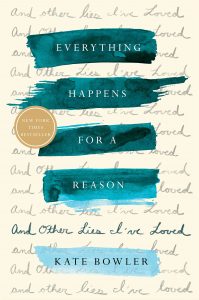At the height of the political tension in King Lear, the corrupt usurpers of Lear’s throne are at the helm of Britain’s defense against French invaders. Cordelia, Lear’s truly beloved daughter and the embodiment of rightly ordered love, commands France’s army. Immediately preceding the battle, Edgar, another good ally, tells his father, “Pray that the right may thrive.” Surely love will conquer corruption. Surely the divine is on the side of the good and will aid humanity’s valiant effort to overcome the forces of evil.
Nope. Two lines later—without the gruesomeness Game of Thrones has made us expect from such battle stories—the trumpet signals France’s withdrawal. Edgar states simply, “King Lear hath lost, he and his daughter ta’en.” So much for Edgar’s prayer.
 Yet prayers like Edgar’s are the quintessential practice of the prosperity gospel, a Christian movement centered on the promise that God guarantees good outcomes for the faithful. Kate Bowler, a historian of religion at Duke Divinity School, wrote the history of this religious movement in her first book, Blessed. In her subsequent memoir, Everything Happens for a Reason (and other lies I’ve loved), Bowler reckons with the human drive for self-determination behind the movement’s prominent tenets: “They are addicted to self-rule, and so am I.”
Yet prayers like Edgar’s are the quintessential practice of the prosperity gospel, a Christian movement centered on the promise that God guarantees good outcomes for the faithful. Kate Bowler, a historian of religion at Duke Divinity School, wrote the history of this religious movement in her first book, Blessed. In her subsequent memoir, Everything Happens for a Reason (and other lies I’ve loved), Bowler reckons with the human drive for self-determination behind the movement’s prominent tenets: “They are addicted to self-rule, and so am I.”
Typically, we think we are the authors of our lives: my happiness is up to me; suffering and struggle are mere phases along my path to long life, success, and fulfillment.
As outrageous as the claim may be that God ensures we get what we deserve, Bowler’s memoir demonstrates how easy it is to presume we are entitled to the predictability, the certainty, that animates the prosperity gospel. Typically, we think we are the authors of our lives: my happiness is up to me; suffering and struggle are mere phases along my path to long life, success, and fulfillment. It wasn’t until Bowler was diagnosed with stage IV colon cancer that she realized she shared this assumption of self-determination, which is also basic to the prosperity gospel. In the torment of grappling with leaving behind her husband, Toban, and their son, Zach, she realizes that what the prosperity gospel offers are lies we all tell ourselves: “the promise that I could curate my life, minimize my losses, and stand on my successes.” These lies not only drive an economy that insists all lemons can be turned into lemonade for a profit, but they also spawn the idea that there should be meaning in suffering. There must be a reason for everything— even the death of an early-career young mother and loving wife—otherwise life’s vicissitudes are constitutive of rather than aberrations from human existence.
Bowler reveals just how difficult it is to confront life’s vagaries without trying to take back control. Her response to her condition is understandable: to find the cure. That there is no cure never slows her down. Get the right drugs, submit to every treatment available, drink awful spinach concoctions offered by well-meaning friends. Grit, tenacity, and relentlessness will be rewarded; if you work hard enough you can achieve your goals. “I’m hooked on the hard way,” she writes. “I know how to suffer. I know how to make the best of things… But I don’t know how to stop.”
Equally tempting is relying on conceptions of redemption conducive to an extraction economy. People in Bowler’s life, both close and anonymous, assert that good can come from her experience—either for her own benefit or for others. The idea is that God can pump out something valuable so people can say the devastation was worth it. The perspective that everything happens for a reason, that the unforeseen can be domesticated and put to use, forces every event into a self-made story with a happy ending. In that story, “The world is a balance sheet.” Tally up the costs and benefits of every moment to find the sum of one’s life.
Instead of seeing life through capitalism’s calculating logic, Bowler learns to see it non-dualistically. “Life is beautiful. Life is hard.” Put religiously—and Bowler’s book demonstrates a theologically astute mind—God’s non-competition explodes the rationality that explains away unaccountable suffering, unredeemable hardship, and unsolvable problems. The bush is on fire but does not burn; the man from Nazareth was human and divine. In the tradition of God’s non-competitive presence in creation, Bowler begins to see that “these opposites”—the wonderful and the terrible, the gorgeous and the tragic—“do not cancel each other out.” While Leonard Cohen maintains that everything cracks so the light can get in, Kate Bowler observes, “I am keeping vigil in the place of almost death.” Every life is terminal, an oncologist tells Bowler. In every life there is joy, there is pain.
The most powerful stories of people who have gone through unimaginable tragedy are not the ones that give reasons for death but those that focus on who was present.
Instead of railing against or demanding justification for human brokenness, Bowler, feels love. This response is not trite but rather witnesses God’s non-competitive presence. According to research, many who come close to death under various circumstances experience the same feeling. The most powerful stories of people who have gone through unimaginable tragedy are not the ones that give reasons for death but those that focus on who was present. Rather than the sophomoric question, “Why do bad things happen to good people,” Bowler asks, “When you were afraid that the end had come, were you alone?” Relationships, not hackneyed philosophical reflection on abstract suffering and the human condition, help Bowler keep vigil. Absent are clichés of righteous anger and divine abandonment and in their place is a mother in her mid-thirties with a Doctorate of Philosophy in Religious Studies gratefully receiving encouraging quilts, warm socks, and sour candy from loved ones.
Bowler communicates this love theologically without being sentimental. The God that is the source of love is “a God that breaks my heart.” She is like the person who told her how he had survived a night of terror but “his neighbour was found outside hanging by a rope the next morning.” Yet somehow he also knew God was present “because he felt peace, indescribable peace, and it changed him forever.” So too, when Bowler faces her impending mortality her people “came in like priests and mirrored back to me the face of Jesus.” Of course, we know what happens to all good things. There is also no recipe for experiencing this love or guarantee that it will happen again. Nothing is certain. All Bowler knows is that after this experience with her most intimate community “I would somehow be marked by the presence of an unbidden God.”
Not that everyone close to her knows how to show their love appropriately. Bowler is poignant but also enjoys acerbic wit, both of which shine exceptionally bright when she describes interactions with her family. Her prayer, starkly contrasted with Edgar’s, is, “Lord, save me from old people.” When her mother-in-law complains about the aesthetic deterioration of getting older Bowler retorts, “I think aging is a fucking privilege.” When her father-in-law waxes that “life is a series of losses” and laments his inability to play racquetball, Bowler sarcastically sympathizes, “I’m soooooorry… Is your looooooong life becoming an encumbrance?” If some readers find themselves wondering how (not) to respond to loved ones with terminal cancer, Bowler has some practical advice in two appendixes: “Absolutely never say this to people experiencing terrible times: A short list,” and “Give this a go. See how it works: A short list.”
Bowler’s reflection on love and suffering remind me of another scene—perhaps not as iconic as King Lear but no doubt familiar to readers of Wendell Berry. At the end of “Health is Membership,” while in the hospital after his brother’s heart attack, Berry describes a much-needed hug between a nurse and his sister-in-law. While some bioethicists may balk at such a scene—is there justice in the hug?—Berry suggests it as a starting point. Love is known in confronting death, but hospitals are often places where the routinization of care makes it seem like there’s no room for love. “I don’t know how to get you, or anyone,” Bowler tells one surgeon, “to pay attention.” And yet she describes feeling transcendent love in the people who cared for her. In the light of that love she sees everyone the same way: people “stumbling in the debris of dreams they thought they were entitled to and plans they didn’t realize they had made.” Life is not lived according to plan; God will not make way for a mapped-out life, no matter how hard one prays. There is no certainty but there is love, on which Bowler lays the foundation for a life of pain, a life of beauty: “I can only hope that my dreams, my actions, my hopes are leaving a trail for Zach and Toban, so, whichever way the path turns, all they will find is Love.”













What convinced me that “everything happens for a reason” is a lie was D.B. Hart’s little book The Doors of the Sea: Where Was God in the Tsunami?, especially his discussion of Dostoevsky therein. At the time I read it I was dating a woman who’d had a terrible childhood, which had included neglect and abandonment, and it made me not only see the paucity, but the sheer crassness, of attempting some answer along the lines of “God had a reason for allowing you to be abandoned by your father and raised by a neglectful alcoholic mother.” And how can one possibly say something like that to victims of child abuse? Somewhere in the book Hart mentions the error of making God’s providence sound like karma. That’s been my rule of thumb ever since: anytime I start thinking of grace/providence as if it were karma I know I’m on the wrong track.
Comments are closed.